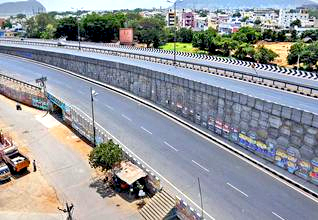Vijayawada, May 24: The death toll due to heat mounted alarmingly in Andhra Pradesh with officials confirming 95 deaths while unconfirmed reports said more than 100 succumbed on Saturday alone. Prakasam district is the worst-hit with 40 casualties and Guntur followed with 20 deaths on a single day.
 Nearly 200 people lost their lives owing to intense heat wave prevailing in the State for the last three days. Daily wage labourers, homeless people and the elderly were the worst hit. The mounting death toll has put the administration on tenterhooks and Chief Minister N. Chandrababu Naidu reviewed the situation with district collectors in Hyderabad.
Nearly 200 people lost their lives owing to intense heat wave prevailing in the State for the last three days. Daily wage labourers, homeless people and the elderly were the worst hit. The mounting death toll has put the administration on tenterhooks and Chief Minister N. Chandrababu Naidu reviewed the situation with district collectors in Hyderabad.
Mr. Naidu announced an ex gratia of Rs. 1 lakh to the families of heat wave victims. Incidentally, the officials concerned paid Rs. 50,000 each to victims till Friday. The situation, according to Mr. Naidu, was alarming, as day temperatures were five to six degrees above normal and will continue to remain so for more than a week.
According to the Disaster Management department, 95 deaths were reported on Saturday alone. According to official figures, Prakasam registered highest deaths with 40 succumbing to the intense heat wave followed by Srikakulam (12), Visakhapatnam (15), Vizianagaram (8), Krishna (7), Nellore (6), East Godavari 4, Anantapur and West Godavari (2 each) and Guntur (1).
In Prakasam district, the toll rose to 77 with the 40 fatalities on Saturday. The district has been in the throes of its worst drought in 45 years, District Revenue Officer Noor Basha Qasim said. Most deaths were reported from Addanki, Erraguntlapalem, Markapur and V.V. Palem mandals in the district.
Prakasam Collector Sujatha Sharma said the deaths were due to sudden surge in day temperature and that drinking water camps would be set up across the district from Sunday. Arrangements were being made to distribute ORS sachets at public places free of cost.
Meanwhile, the administration in the districts stepped up relief measures and Krishna District Collector Babu A cancelled the weekly Mee Kosam grievance redressal programme scheduled on Monday due to heat wave conditions in the district. Interestingly, coastal districts registered high temperatures as compared to Rayalaseema districts, usually known for registering high temperatures during the season.
The heat wave continued unabated in Krishna with Nandigama and Vijayawada registering the highest maximum temperature of 47 degrees Celsius each. Bapatla in Guntur recorded 45.9 degrees Celsius followed by Ongole (44.3 degree Celsius). In Rayalaseema region, Anantapur and Kurnool districts recorded 41.2 degree Celsius.





Comments
Add new comment